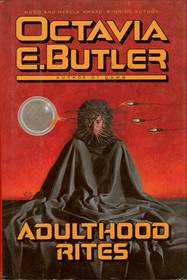I read this book in less than a day. I devoured it! Once again, the characters are brilliant (all the same ones from the first novel, with a few interesting additions). The conflict still gripped me - I could, again, see both sides, empathize with both sides, etc. This is a book that definitely made me ruminate and think on the ideas presented, how they apply to humans on earth, right now.
In a way, I found this book rather depressing. Just in terms of what it is saying about humanity and our chances of survival. I'm an optimist/idealist. So, the depressing tone on humanity is hard for me to take.
However, there is room for hope - even in the novel.
5 stars. I can't wait to read the final novel in this trilogy. Not to mention all the other books this author has written.
Octavia Butler is an outstanding author. With that being said, this series made me furious--not because of the writing style, but the premise behind the series. A few humans decide to commit extinction of our species through nuclear war (I guess to cleanse the Earth although it is never stated why). The Oankali (tentacled aliens) sweep in and save the few of us that survive, placing the survivors into suspended animation until Earth is healed of the radiation and ready to be recolonized. The price for saving us is that humans will no longer be able to have children on their own, but will instead have their genes "traded" with the Oankali to create hybrids. This doesn't take place through sex, well at least not a form of sex we would recognize, but rather through the non-gender Ooloi (Oankali who are natural genetic engineers). The resulting hybrids may start off looking human, but their alienness soon becomes apparent when they reach adulthood. Once the humans that survived the nuclear war die, there will be no more humans--rather a hybrid race that will eventually strip the Earth of resources and take off into space to find another species to "trade" with.
What made me angry about this--and perhaps that was Butler's point--is throughout the book the Oankali kept saying that humans were flawed because of our hierarchical nature, yet they lord over us in everything. They changed the way we lived, what food we ate, took away our humanity (humans that refused to mate with them had a choice to either die sterile, be put in suspended animation and have their genes taken anyway, or be exiled to Mars whereas humans that did agree to mate with them were never able to have sex with another human again). What made this right and us wrong?




